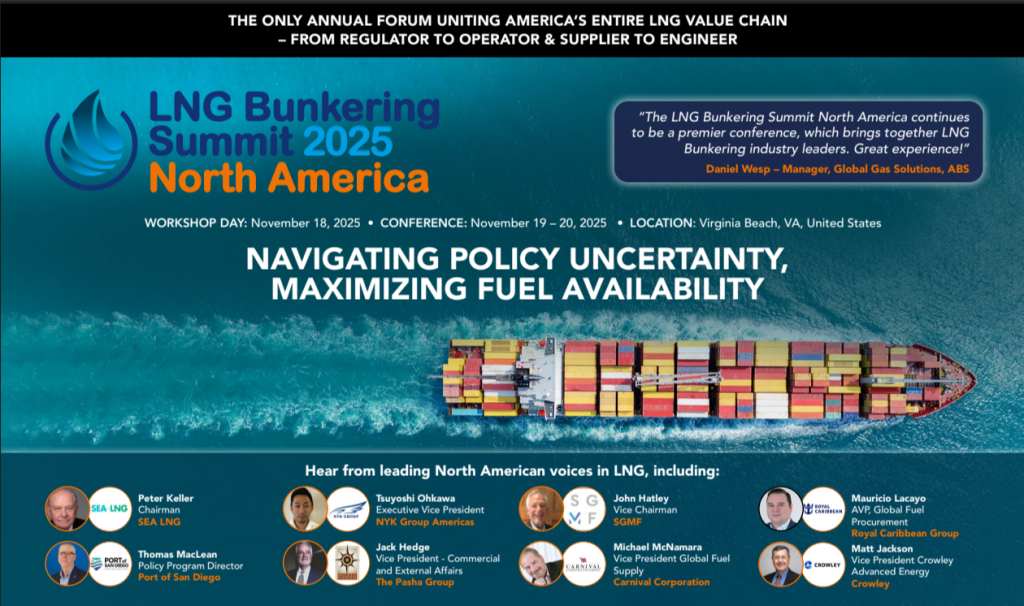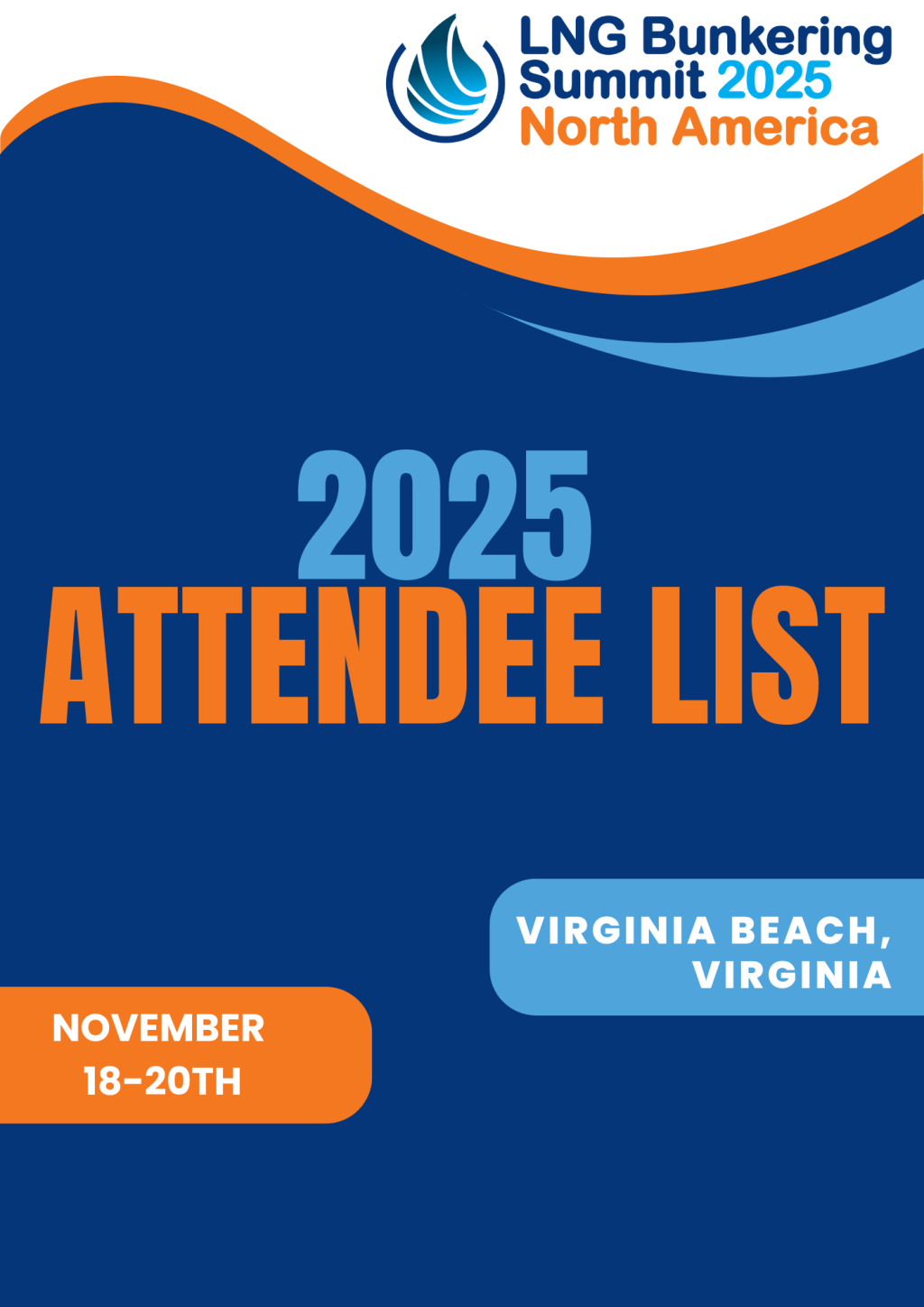Exclusive Content

The 2025 LNG Bunkering North America Summit Agenda
You’re navigating a turning point for LNG in maritime. A new US administration has signaled that LNG is a priority, yet its actual impact on the industry remains uncertain. At the same time, IMO global regulations are emerging that don’t necessarily favor LNG, leaving many wondering what the fuel’s true role will be in the years ahead.
This summit is your opportunity to:
- Prepare for shifting US policy and its real-world implications.
- Understand how to remain compliant under evolving IMO regulations.
- Address shipbuilding pressures and lagging bunkering infrastructure.
- Tackle urgent questions around fuel strategy, compliance, and supply chain readiness.
Be part of the conversation shaping LNG’s future in maritime—we look forward to welcoming you.

Global Maritime Decarbonization Post Show Report
Ahead of this year's LNG Bunkering North America Summit, taking place from the 18-20th November in Virginia, we wanted to share valuable insights, session highlights, and more from our Global Maritime Decarbonization Summit, held this May. The event touched on several key issues that we’ll be taking a deeper dive into this November, this time through a North American lens.

LNG Bunkering & Future Fuel Global Summit 2024 - Post Show Report
Ahead of the LNG Bunkering North America Summit, we wanted to share with you our Global LNG Bunkering and Future Fuels Global Summit 2024 post show report,.
The Summit focused on several critical topics such as unlocking the value in our fuel by maximizing the benefits of current LNG investments through technological advancements and exploration into Bio/E/Synthetic LNG and retrofitting, preparing for the transition to alternative fuels such as ammonia, hydrogen, and methanol by learning from early adopters and hearing updates on global availability, and understanding the evolving regulation landscape, including industry alignment with IMO30 and IMO50, and the impact of Cop28 on the maritime industry - plus much more.
Download this Post Show Report to learn more about:
- Our 2024 speakers
- Key sessions and takeaways
- What our attendees had to say about their experience
![[NEW] Alternative Marine Fuels: A Comprehensive Outlook on Future Trends [NEW] Alternative Marine Fuels: A Comprehensive Outlook on Future Trends](https://eco-cdn.iqpc.com/eco/images/event_content/bbLkeCaRGTdd5HeRDDo4t0uFobRgNEsH15kkrmQs.png)
[NEW] Alternative Marine Fuels: A Comprehensive Outlook on Future Trends
Discover the future of maritime energy with our new mini-report on alternative marine fuels.
Our latest mini report, an extract from our comprehensive study LNG Availability and the Transition to Bio-LNG and Green LNG (2024-2026), provides crucial insights into the evolving landscape of alternative marine fuels. This report delves into the projected fuel usage within the global maritime sector, highlighting the anticipated energy demand and the role of various alternative fuels such as LNG, LPG, biofuels, ammonia, hydrogen, methanol, and electricity.
Key Insights include:
- Projected energy demand: detailed data on the global maritime sector’s energy needs and how alternative fuels are expected to meet these demands.
- Alternative fuel ships on order: current statistics on the number of ships being built to utilize these alternative fuels.
- Challenges: analysis of the complex economic dynamics, feedstock availability, safety concerns, insufficient production capacity on biofuels, limited R&D investments, focus on island shipping, engineering capacity, and methane slips.
- Alternative fuel financing: insights into the financial mechanisms supporting the transition to alternative fuels.

LNG Bunkering North America Summit 2025 Attendee Snapshot
Interested in seeing who you might meet at LNG Bunkering North America 2025? Download our attendee list to view the organizations that will be joining us this year!

Dive into the Data: Exclusive Insights from our Brand New Report
As we gather industry leaders, innovators, and stakeholders to discuss the future of LNG at the LNG Bunkering Summit, North America, November 18-20, 2024, we are excited to present a comprehensive collection of raw data and detailed graphs from our upcoming report, 'LNG Availability and the Transition to Bio-LNG and Green LNG (2024-2026).'
This exclusive content is designed to provide you with in-depth insights and a deeper understanding of the trends, challenges, and opportunities shaping the LNG landscape.
By delving into this raw data, you'll gain:
- Actionable Insights: Make informed decisions based on the most current and comprehensive data available
- Competitive Edge: Stay ahead of the curve with detailed market analysis and projections
- Enhanced Understanding: Deepen your knowledge of the key factors influencing the LNG industry
By accessing this preliminary data, you get an early look at the critical information that will be fully detailed in the upcoming report. Access the full dataset and graphs now to stay at the forefront of the LNG revolution.

Unlocking the Future: Accessing Renewable Fuels Incentives for the Maritime Industry
The RFS program aims to reduce greenhouse gas emissions and promote renewable fuels in the United States. Renewable fuels are produced from renewable biomass and reduce the amount of fossil fuels in transportation fuel, heating oil, and jet fuel. A Renewable Identification Number (RIN) is assigned to each gallon of renewable fuel, and obligated parties must meet Renewable Volume Obligations (RVO) to achieve renewable fuel targets. However, renewable fuels used in ocean-going vessels currently do not generate RINs.
This white paper discusses the eligibility of RINs and the potential for a marine RIN market if the definition of transportation fuel is changed to include ocean-going vessels.
This information is courtesy of research from Margaret Doyle, Alternative Fuels Program Manager, Transparensea Fuels, LLC and President and Founding Director, PortVision50.
Download this document to discover:
- How to define RINs
- RIN Eligibility
- Why ocean vessels aren’t eligible
- The real-world applications of RINs
![[Interview] Anchoring Change: How LNG Bunkering is Steering Maritime Sustainability [Interview] Anchoring Change: How LNG Bunkering is Steering Maritime Sustainability](https://eco-cdn.iqpc.com/eco/images/event_content/7RU7j6MK0sKNis1er0wvm0YnRmdRveiRQnq31vMx.png)
[Interview] Anchoring Change: How LNG Bunkering is Steering Maritime Sustainability
The maritime industry stands at a pivotal crossroads, where the waves of tradition meet the currents of innovation. As global trade continues to expand, the sector faces an urgent need to harmonize its decarbonization efforts. This interview with Mihaly Wekler, Vice President of Operations and Business Development, Anew Climate delves into the heart of the matter, exploring how collective initiatives and industry-driven frameworks can steer the maritime world towards a more sustainable future. With a particular focus on the transformative potential of LNG bunkering, this interview navigates the complexities of alternative fuels, regulatory challenges, and the power of unified action in the quest for a greener horizon.
Download this interview to learn more about:
- Unified Decarbonization Efforts: Discover how industry-driven organizations and international bodies can create a harmonized framework for decarbonization, ensuring that all maritime stakeholders are aligned in their sustainability goals.
- Challenges of Alternative Fuels: Gain insights into the complexities of adopting alternative fuels like RNG, Methanol, Ammonia, and Hydrogen, including the often-overlooked operational and infrastructure demands.
- Improving Transparency and Comparability: Learn about the importance of setting realistic expectations and the role of trade organizations in enhancing the transparency and comparability of costs associated with alternative fuels.
![[Interview] Navigating the Maritime Energy Transition: JAXPORT's Role in Advancing LNG Bunkering and Sustainable Shipping [Interview] Navigating the Maritime Energy Transition: JAXPORT's Role in Advancing LNG Bunkering and Sustainable Shipping](https://eco-cdn.iqpc.com/eco/images/event_content/f9UginM6z0pWcGLRIRIBCC4y11QVVOvZ1UceaSRc.png)
[Interview] Navigating the Maritime Energy Transition: JAXPORT's Role in Advancing LNG Bunkering and Sustainable Shipping
With limited biofuel availability posing a significant challenge, ports are pivotal in advancing sustainable shipping practices. To gain insights from the perspective of a Port Authority, we spoke with Rick Schiappacasse, Director Forest Products & Speciality Cargo, JAXPORT, Jacksonville Port Authority. Here, he shared how JAXPORT is leading the way in these efforts, particularly through the development and use of LNG as a cleaner fuel alternative.
Download this interview to learn more about how:
- JAXPORT is enhancing its LNG bunkering infrastructure, balancing large-scale and small-scale LNG facilities.
- JAXPORT is leveraging digital technologies for energy efficiency.
- The port’s collaborative efforts with shipping companies and manufacturers to accelerate the development of zero-emission vessels.

Charting the Course to Sustainable Shipping: Interview with Ilyas Muhammad
In this exclusive interview with Ilyas Muhammad, Head of Green Fuels at Hapag-Lloyd, he reveals their ambitious plan to achieve net-zero carbon emissions by 2045, setting a course towards a sustainable future.
Discover how Hapag-Lloyd is undergoing the transition to alternative fuels, such as Bio-LNG and green methanol to reduce CO2 intensity and combat climate change. Gain insights into the challenges and opportunities inherent in this transformative journey, from scaling up biomethane production to navigating regulatory landscapes.
Download this interview to learn more about:
- Cutting-edge technologies and innovative solutions driving the decarbonization of the maritime sector.
- Advancements in biomethane production and reactor design.
- How collaboration with stakeholders and supportive regulatory mechanisms are essential for a cleaner and greener industry.

The Regional Opportunities Report (2023-2025)
The period from 2023 to 2025 represents a pivotal phase in the development of the LNG bunkering and alternative marine fuels market. This timeframe presents new regional opportunities that can reshape the industry landscape, providing fresh avenues for growth, investment, and collaboration.
Ahead of this year's LNG Bunkering North American Summit, our New Regional Opportunities Report (2023-2025) recognizes the significance of these opportunities and delves into the regional dynamics and developments within the LNG bunkering sector, while also exploring the advancements in other alternative marine fuels. The report is designed to provide stakeholders with a comprehensive understanding of the evolving market landscape, enabling them to make informed decisions and seize emerging opportunities. By analyzing the latest trends, market drivers, technologies, and challenges, this report offers valuable insights into the regional prospects of LNG bunkering and alternative marine fuels.
Read the report and discover:
- A market overview of the maritime trade
- The global LNG Bunkering market for selected countries including Australasia, Asia, Europe, the Mediterranean, Baltic and North America
- The global LNG Bunkering vessels in use/projections
- The key drivers of decarbonization within the maritime industry
- Technologies being utilised to reduce greenhouse gas emissions
- An alternative fuel outlook, discussing the pros and cons of LNG, LPG, Biofuels, Ammonia, Hydrogen, Methanol and Electricity
- Top challenges within the maritime industry
Download the full report here! >>>

The Newest Regulations and Regulatory Changes: US Maritime Industry
IMO 2050 is looming and remains a key catalyst for the maritime industry to decarbonize. In the US, regulation and legislation are handled by policymakers and the US Coast Guard. But how are these groups helping to facilitate the energy transition? With this at the forefront of many leaders’ agendas, we highlight the newest regulations and regulatory changes in the US that you need to know this year, to ensure your organization remains compliant in its effort to decarbonize the sector. In this piece we will cover the revision of the IMO GHG strategy, EEDI, EEXI and CCI.
Read more and discover:
- Revision of the IMO GHG Strategy
- Adjustments to the Energy Efficiency Design Index (EEDI)
- Energy Efficiency Existing Ship Index (EEXI) survey requirements take effect
- Carbon Intensity Indicator (CII) data collection
Download the full article here >>>



